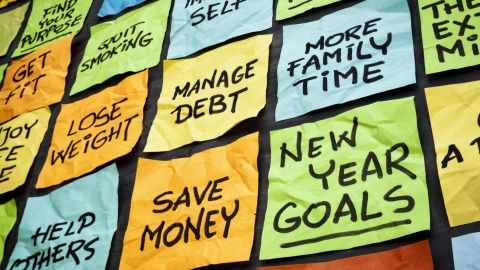How to Con Your Future Self into Following Through on New Year’s Resolutions

It’s that time of year again: the moment you can change your life for the better. But promising to ourselves that we’ll do something specific in the future is no way to ensure that we’ll do it. The vast majority of New Year’s resolutions, by some counts 88 percent, fail. Without a mechanism to encourage compliance, without some self-conniving, the natural tendency you have not to comply with your resolution (which is why you need to “resolve” to do it in the first place) will almost always win out. It doesn’t matter how worthy or wonderful your resolution is. If you don’t hack your brain a little, today’s resolution will become next winter’s regret.
Imagine, for a moment, that you recently discovered you are an opera lover. A friend dragged you to “Aida” last year and you were enraptured. The same friend took you to “Don Giovanni” and you melted as the first ominous notes of the overture filled the hall. You’d like to harness your new-found interest. You want to learn more about the genre, buy some recordings and read up on the lifestyles of rich and famous sopranos. You especially want to go to more live performances, and you reside in a city with an excellent opera company. But here’s the problem: you’re lazy, you’re cheap, and your friend just moved out of town. Without your friend around, you know there’s little chance you will be heading back to the opera house any time soon. You’ll probably spend your Saturday nights on your couch watching Star Trek reruns with a side of ramen noodles.
Here’s what you can do, if you want to encourage your future self to comply with your present wishes: buy season tickets to the opera.Your shiftlessness may well overcome you on a few evenings during the opera season, but more often than not, you will honor the decision of your previous self and drag yourself to the opera.
Of all the irrational tendencies that mark human existence, one in particular will be of service to you in this situation, if you exploit it: the phenomenon of honoring what economists call “sunk costs.” The late philosopher Robert Nozick, in a 1993 book on the nature of rationality, explained the bias:
“Economists present a doctrine that all decisionmaking should pay attention to only the (present and) future consequences of various affirmative actions. The cost of past investments in these courses of action have already been incurred….These costs, “sunk costs” as the economists term them, are a thing of the past; all that matters now is the future stream of benefits. Thus, sitting at home this evening, if I now would prefer staying home to going out and attending a performance…then this evening at home has higher utility for me than traveling out and attending the performance; therefore, I should stay at home. It should make no difference that I already have spent the money on the ticket for the performance—so runs the economists’ doctrine that sunk costs should be ignored.”
According to sound principles of rationality, it makes no sense to make the trek to the opera on a particular night if you would really prefer to veg out on the couch. It doesn’t matter how much you have paid for the ticket: the investment you’ve made is non-refundable, and it’s in the past. If you paid $80 for a ticket, you will have paid that $80 whether or not you find it within yourself to attend the performance. The cost is sunk either way. The price you have already paid for the ticket should have no bearing on your decision to use it.
Yet, of course, it does. Most of us would have the sense of having wasted money if we opted out of the evening at the opera for which we had already paid for a ticket, and we will do what it takes to avoid feeling as if we have wasted a sum of money. This is why we rarely walk out of movies we can’t stand. It’s why we tend to finish a mediocre dish of ice cream we’ve paid four bucks for but aren’t enjoying, despite the pointlessly incurred additional cost in fat and calories larding those last few spoonfuls. It’s why you have such a hard time throwing out the expensive tschotske you bought in 1996 even though you’ve hated it since 1999. Honoring sunk costs can often run contrary to our interests, as the television show “Hoarders” depicts most tragically. Yet sometimes incorporating sunk costs into our decision-making can benefit us, as in the opera example. Here is Nozick again:
“If I know I will be tempted some evening in the future by the smaller immediate reward of comfort (not having to go out into the rain, and so on), yet I also know that now and afterward too I will be happy to have attended all those performances, then I can buy the tickets now, in advance, to spur myself to forgo staying home when that evening arrives.”
In essence, you trick your future self into complying with your current plans. You rationally take advantage of your irrational tendency to honor sunk costs to get yourself to do something. Or in Nozick’s words:
“We can knowingly employ our tendency to take sunk costs seriously as a means of increasing our future rewards. If this tendency is irrational, it can be rationally utilized to check and overcome another irrationality.”
Goodbye Mr. Spock, hello Mr. Giovanni.
One way to increase your chances of following through is by sinking a cost on January 1—buying a gym membership, say, to encourage you to get off your duff and work out in the year ahead. While this can be an effective strategy, research shows that gym attendance drops off considerably a few months into the new year. The sunk and continuing cost of the membership looms over your head and may cause you guilt, but you can always rationalize to yourself that tomorrow is another day—you can always go to the gym later. There is no particular need to go now to honor your sunk costs. This can easily become a daily deferment.
So even better than a gym membership is a pack of exercise classes—a semester’s worth of yoga sessions, say, or a series of track workouts—in which you pay for discrete activities at particular points in time. Here you are much more likely to inspire the acquiescence of your future self. For one, these sessions are use it or lose it, and you’ll be loath to waste sessions that you have paid for in advance. For another, they represent something of a commitment not only to yourself but to a group of fellow travelers—yogis and runners, in our examples—and other people will notice you are missing when you’re absent. If your exercise plan is even more tied in with other people’s interests—you have a running buddy for your Saturday speed workout, say, or you’re the go-to point guard in a group of guys who play basketball at the Y every Tuesday night—you’ll be even less likely to skip out when you’re feeling lethargic. (This takes the investment out of the class of strictly sunk costs, since abrogating a commitment may impose interpersonal costs on you in the future: you won’t stay friends with those guys for long if you make a habit of leaving them high and dry every Tuesday.)
The bottom line? Ask yourself where you want to be a year from now and devise a plan to realize that goal. But don’t stop there! Put your money where your mouth is. A financial commitment will sink a cost you won’t want to waste later on.
Image credit: Shutterstock.com





